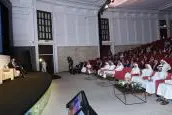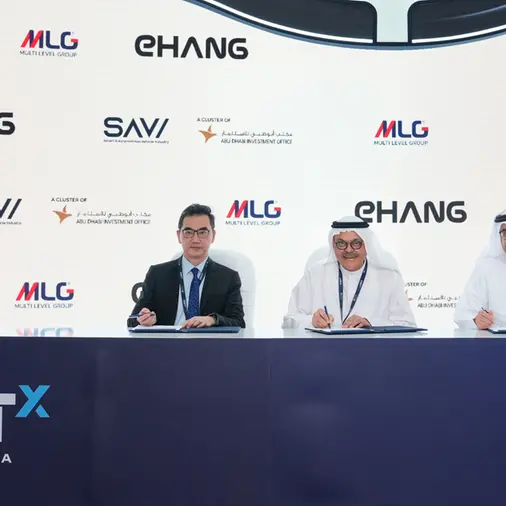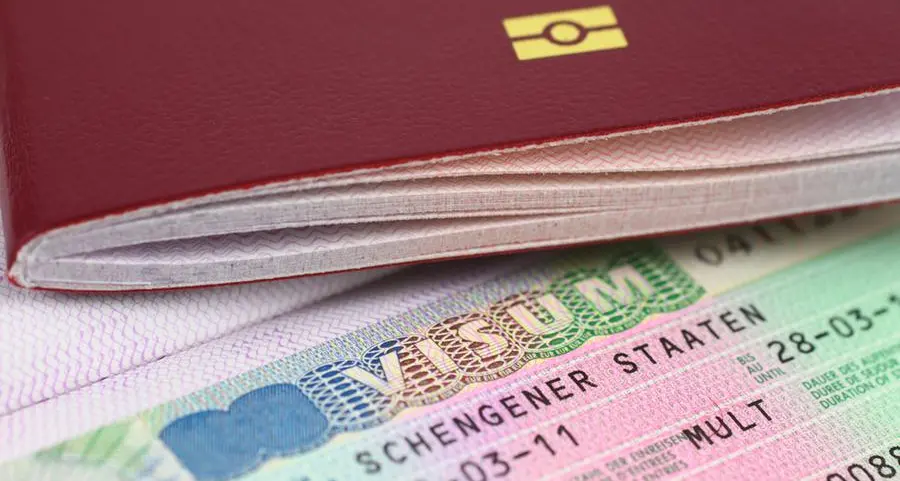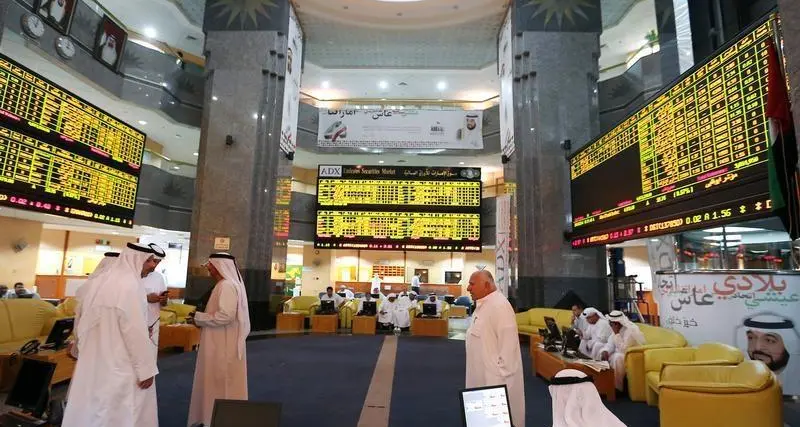PHOTO
- Government is ‘shaping the future’ of transportation to transform the urban environment
- Attitudes of car manufacturers and drivers will need to change as shared mobility becomes the norm
- 25 per cent of all transportation trips will be Smart or driverless by 2030
- 50 per cent of private cars will have self-driving features within the next 10 years
Abu Dhabi, UAE, March 29, 2017
In a wide-ranging speech at the Global Manufacturing and Industrialisation Summit (GMIS), taking place at the Paris-Sorbonne in Abu Dhabi, His Excellency Mattar Al Tayer, Director General and Chairman of the Board of Executive Directors of the Roads and Transport Authority (RTA), said that he was “optimistic for the future” of transportation, but that “questions and challenges remain.” He also said that the Emirate was already using new technology to address the opportunities and challenges facing the transportation sector.
Al Tayer was setting out the vision of the RTA in transforming Dubai based on the future trends of shared mobility, driverless transport, innovative modes, connectivity and sustainability. This is being driven by factors such as, increased safety, the reduction of travel times and protection of the environment. He stated that within ten years, self-driving will be widely deployed, but more innovative concepts, such as the Hyperloop and flying cars, will take longer to be deployed. On the emirate’s vision, Al Tayer said: “Dubai is aspiring to play a leading role in this line of the industry by 2030 through a comprehensive smart self-driving mobility strategy with clear-cut targets. Such a strategy requires developing an apt legislative infrastructure, besides forging strategic partnerships with the private sector, research centers and specialist firms.”
Al Tayer added: “Thanks to the far-sighted vision of HH Sheikh Mohammed bin Rashid Al Maktoum, Vice-President and Prime Minister of the UAE and Ruler of Dubai, and the close follow-up of HH Sheikh Hamdan bin Mohammed bin Rashid Al Maktoum, Dubai Crown Prince and Chairman of the Executive Council, a clear target was set. This target envisions converting 25 per cent of total journeys in Dubai into journeys on self-driving transport by 2030. Thanks to this visionary policy, Dubai has managed to thrust itself to the forefront of autonomous mobility worldwide. Accordingly, the Dubai Metro boasts of being the longest driverless metro network in the world; and now lifts more than 650,000 riders per day. Phase II of the Dubai Tram, which is fitted with some driverless technologies, will witness the deployment of fully automated self-driving trams.”
As a result of the RTA’s transportation strategy, Al Tayer added that there will be significant benefits, with a 12 per cent reduction in the emirate’s carbon footprint, a 45 per cent reduction in the cost of mobility to consumers and a 12 per cent increase in transport safety – while 50 per cent of car parking spaces will not be needed and can be used for other urban development projects.
“Dubai has started to reap some of the benefits of Self-Driving Transport as the punctuality of the Dubai Metro service has improved by 6.4 per cent compared with conventional metro networks, and we expect that the Self-Driving Transport strategy to generate economic benefits to the worth of billions of dirhams every year,” he said. “By 2030, futuristic mobility means are anticipated to reduce mobility cost by 45 per cent, cut the demand for parking by 50 per cent, and curb carbon emissions by 12 per cent. It is also expected to cut short accidents and associated losses, and enhance the happiness rating of people as a result of the offering of new transit options.”
According to Al Tayer, shared mobility will have a significant impact on both the urban environment and consumers over the next decade. Within ten years Al Tayer estimated that 30 per cent of commuters will share cars leading to a significant reduction in the number of private cars on Dubai’s roads. He claimed that a single car sharing arrangement will replace between 9 and 13 vehicles. He noted that car manufacturers may well resist such a change, but need to adapt. He also said that driver culture needed to change, but that the government had to ensure that people were aware and educated on the changes to come.
The RTA is already adopting the new technology in Dubai, which has the world’s largest driverless metro system, used by 650,000 people every day. Al Tayer stated that 7.5 per cent of Dubai’s taxi fleet was hybrid and that 200 Telsa electric limousines had been ordered for use at the airport. He added that Dubai Integrated Mobility Platform is currently being trialled and will be a first for the region. He said: “The RTA is currently engaged in the development of the Integrated Mobility Platform in Dubai, rendering it one of the first cities to develop such a platform in the world. This platform enables customers access to all transit means in Dubai through a single window [a smart app], and a unified Control Center linking all control centers run by RTA’s operational agencies.”
The inaugural Global Manufacturing and Industrialisation Summit is being held at the Paris-Sorbonne Abu Dhabi University, UAE, until March 30, 2017. A joint initiative by the UAE Ministry of Economy and the United Nations Industrial Development Organization (UNIDO), and co-hosted with the Abu Dhabi Department of Economic Development, the Summit is held under the patronage of His Highness Sheikh Mohamed bin Zayed Al Nahyan, Crown Prince of Abu Dhabi and Deputy Supreme Commander of the UAE Armed Forces. The Summit is the world’s first global gathering for the manufacturing community, bringing together decision-making leaders from governments, businesses and civil society organisations to shape a vision for the sector’s future.
The Summit is a global platform for participating attendees to learn from best practices from across the world. This unprecedented global gathering will spark new ideas and set the stage for debate and action – addressing ways in which manufacturing can shape and reshape the world, integrating activities between developed and emerging markets, and delivering on social responsibility towards future generations. Leaders from the public and private sectors, along with representatives from civil society organisations, will gather to discuss global challenges within the manufacturing sector, looking specifically at six themes: technology and innovation; global value chains; skills, employment and education; sustainability and environment; infrastructure; standards, and stakeholder alignment.
-Ends-
About the Global Manufacturing and Industrialisation Summit
As the world’s first cross-industry forum, the Global Manufacturing and Industrialisation Summit is a global gathering for manufacturing minds. It is a voice and a venue for global manufacturing transformation. More than 1,200 delegates will attend, including world leaders, industry CEOs, policy-makers, specialist researchers and academics. The Global Manufacturing and Industralisation Summit will deliver (i) a voice for transformational ideas, (ii) a venue for the generation of new networks and cross-industry partnerships, (iii) a showcase for pilot projects arising from cross-industry research,
Global Agenda on the Future of Manufacturing
The conference will focus on the role of manufacturing in reconstructing the global economy and restoring global prosperity. Leaders from the public and private sectors, along with civil society representatives, will gather together to discuss global challenges facing the manufacturing sector. The discussions will focus around six themes: technology and innovation; global value chains; skills, employment and education; sustainability and environment; infrastructure; standards and stakeholder alignment. The participants will form working groups to identify concrete action plans and recommendations that outline potential solutions to global issues, as well as showcase best practices and case studies from across the world. To highlight an example of global issues, the inaugural conference will focus on the issue of economic migration, with the aim of establishing a manufacturing platform that will bring together countries facing emigration or immigration challenges with regional countries that seek to support economic reconstruction. These countries will work together with manufacturers and the wider United Nations network on restoring global prosperity.
The Manufacturing Expo
Capitalising on the huge presence of the global manufacturing community under a single meeting venue, the Manufacturing Exhibition will offer space to corporations looking to showcase their products, services and latest innovations or technologies that can further contribute to promoting global economic development. The Manufacturing Expo consists of four components: an exhibition showcasing the manufacturing capabilities of the host country; international pavilions showcasing the manufacturing capabilities and economic incentives of each participating country; an innovation exhibition that demonstrates the latest fourth industrial revolution technologies; and an event for SMEs to present their products and solutions to potential customers.
The Global Value Chain Market
The Global Value Chain Market (GVCM) is a business matchmaking platform dedicated to increasing regional and international partnerships and opportunities. The platform will provide networking and sourcing opportunities both online and onsite via pre-scheduled meetings with the vision of forging investment opportunities, commercial partnerships, and encouraging technological transfer and knowhow. The platform will enable countries to identify and meet global manufacturers to promote industrial development, and familiarise global manufacturers with targeted industrial activities in various countries. The GVCM will become a source of valuable information for global investments, providing insights on legislation and regulations, sovereign risk, political stability, and physical and logistical infrastructure.
For additional enquiries contact:
ASDA’A Burson-Marsteller
gmis@bm.com
Mohammad Shaban
mohammad@gmisummit.com
© Press Release 2017











